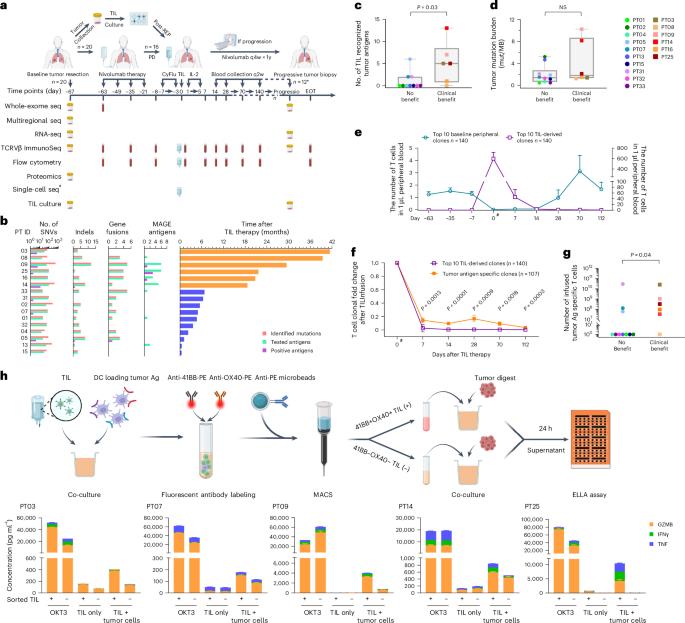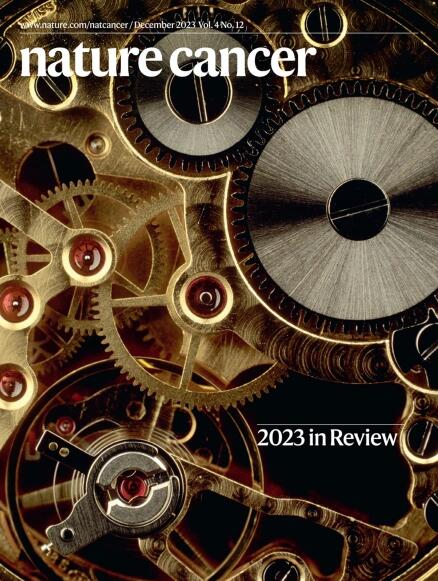对TIL细胞治疗无反应的转移性非小细胞肺癌患者的T细胞和新抗原保留受损的时间序列分析。
IF 28.5
1区 医学
Q1 ONCOLOGY
引用次数: 0
摘要
肿瘤浸润淋巴细胞(til)的细胞治疗已经对多种癌症类型产生了持久的反应,但治疗耐药性的原因仍然很大程度上未知。本文对肺癌TIL治疗试验中肿瘤和血液的时间序列进行了多维分析。通过对功能扩增的T细胞和新抗原负载四聚体分类的T细胞进行T细胞受体测序,我们鉴定出肿瘤抗原特异性T细胞受体。然后,我们将克隆映射到个体转录组中,发现在缺乏临床益处的患者中,肿瘤反应性克隆型表达功能失调的程序,缺乏干细胞样特征。随着时间的推移跟踪肿瘤反应性克隆型,抗原反应性外周T细胞克隆型的衰减与进行性疾病的出现有关。此外,先前被输注T细胞靶向的亚克隆新抗原随后在肿瘤进展中缺失,表明潜在的适应性抵抗。我们的研究结果表明,靶向克隆抗原和绕过功能失调状态可能对TIL治疗的临床反应很重要。本文章由计算机程序翻译,如有差异,请以英文原文为准。

Impaired T cell and neoantigen retention in time-serial analysis of metastatic non-small cell lung cancer in patients unresponsive to TIL cell therapy
Cell therapy with tumor-infiltrating lymphocytes (TILs) has yielded durable responses for multiple cancer types, but the causes of therapeutic resistance remain largely unknown. Here multidimensional analysis was performed on time-serial tumor and blood in a lung cancer TIL therapy trial. Using T cell receptor sequencing on both functionally expanded T cells and neoantigen-loaded tetramer-sorted T cells, we identified tumor antigen-specific T cell receptors. We then mapped clones into individual transcriptomes and found that tumor-reactive clonotypes expressed a dysfunctional program and lacked stem-like features among patients who lacked clinical benefit. Tracking tumor-reactive clonotypes over time, decay of antigen-reactive peripheral T cell clonotypes was associated with the emergence of progressive disease. Further, subclonal neoantigens previously targeted by infused T cells were subsequently absent within tumors at progression, suggesting potential adaptive resistance. Our findings suggest that targeting clonal antigens and circumventing dysfunctional states may be important for conferring clinical responses to TIL therapy. Wang et al. present T cell receptor sequencing of serial tumor and blood samples from TIL-treated patients with non-small cell lung cancer, identifying tumor-reactive clonotypes expressing dysfunctional programs in patients lacking clinical benefit.
求助全文
通过发布文献求助,成功后即可免费获取论文全文。
去求助
来源期刊

Nature cancer
Medicine-Oncology
CiteScore
31.10
自引率
1.80%
发文量
129
期刊介绍:
Cancer is a devastating disease responsible for millions of deaths worldwide. However, many of these deaths could be prevented with improved prevention and treatment strategies. To achieve this, it is crucial to focus on accurate diagnosis, effective treatment methods, and understanding the socioeconomic factors that influence cancer rates.
Nature Cancer aims to serve as a unique platform for sharing the latest advancements in cancer research across various scientific fields, encompassing life sciences, physical sciences, applied sciences, and social sciences. The journal is particularly interested in fundamental research that enhances our understanding of tumor development and progression, as well as research that translates this knowledge into clinical applications through innovative diagnostic and therapeutic approaches. Additionally, Nature Cancer welcomes clinical studies that inform cancer diagnosis, treatment, and prevention, along with contributions exploring the societal impact of cancer on a global scale.
In addition to publishing original research, Nature Cancer will feature Comments, Reviews, News & Views, Features, and Correspondence that hold significant value for the diverse field of cancer research.
 求助内容:
求助内容: 应助结果提醒方式:
应助结果提醒方式:


